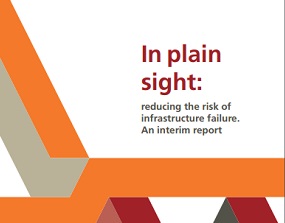In Plain Sight: reducing the risk of infrastructure failure
Contents |
[edit] Introduction
During his tenure, the out-going ICE President Tim Broyd asked Professor Peter Hansford of BRE to review whether the potential vulnerabilities in economic infrastructure are fully understood.
‘In plain sight: reducing the risk of infrastructure failure. An interim report’ is the first output from the review, published in November 2017.
The review does not investigate the details of the Grenfell Tower disaster, which are the subject of a public inquiry, nor does it specifically examine tower blocks or fire.
The Grenfell Tower fire was a profound shock for the country and raised the concern that any failings may be found to be systemic and not site specific. In these circumstances, organisations for professionals in all areas of the built environment sector should examine whether action needs to be taken to deliver safer and more effective whole-life stewardship of assets.
[edit] Background to the interim report
Much of infrastructure comprises legacy assets put to daily use by far more people than originally envisaged. For new assets, the procurement, funding and management techniques may be complex. This can cause difficulties around continuity of knowledge, vision and intent.
These and similar pressures impacting the nation’s infrastructure invite the question of whether there are increasing risks of infrastructure failure and, if already apparent – hiding in plain sight?
[edit] Interim report recommendations
The key lesson from previous incidents in infrastructure and other sectors is there is never one single cause of failure. Failures happen when multiple factors align at a single point in time, for example: human error; poor design; weather conditions, etc.
The Panel’s interim conclusions are the result of a two month period of study and consultation. The Panel has found that while the risk of a major failure of UK infrastructure is relatively low, it is still not low enough. ICE should, work with government and other stakeholders, to consider afresh what steps are necessary to reduce further risks of failure.
The interim report has four main areas of recommendation:
[edit] Validation
ICE should commission a study to analyse and validate the 12 lines of defence against infrastructure failure in the model set out in this interim report.
[edit] Lesson sharing
ICE should work with other infrastructure organisations to improve how the sector shares information from safety reviews, accidents, failures and near misses.
[edit] Competence
ICE should review the robustness of its Continuing Professional Development regime and Professional Code of Conduct. ICE should also review the effectiveness of arrangements for professional oversight of assets in different sub-sectors of infrastructure.
[edit] Governance
ICE should work with other infrastructure organisations to identify if improvements can be made to the governance role in the development and management of assets. This should include the competence of boards, scrutiny systems and the presence of a technically competent engineering voice in safety-critical decisions.
In addition to commissioning a study on the 12 lines of defence, the Panel recommends establishing three Task and Finish groups to take forward the three areas of Lesson sharing, Competence and Governance.
You can download the report here.
This article was originally published here by ICE on 6th Nov 2017. It was written by Gavin Miller.
--The Institution of Civil Engineers
[edit] Related articles on Designing Buildings
- Articles by ICE on Designing Buildings Wiki.
- Avoiding disaster in existing buildings and infrastructure.
- Building our Industrial Strategy: green paper.
- Five key themes for global infrastructure policy in 2021.
- Government construction and infrastructure pipelines.
- Highways Infrastructure Asset Management Plans.
- In Plain Sight: Assuring the whole-life safety of infrastructure.
- Infrastructure.
- National Infrastructure Commission.
- National Infrastructure Plan.
- National Infrastructure Plan for Skills.
- Structural failures prompt recognition of complex management systems.
- Uncertainty in the civil engineering profession.
Featured articles and news
A case study and a warning to would-be developers
Creating four dwellings for people to come home to... after half a century of doing this job, why, oh why, is it so difficult?
Reform of the fire engineering profession
Fire Engineers Advisory Panel: Authoritative Statement, reactions and next steps.
Restoration and renewal of the Palace of Westminster
A complex project of cultural significance from full decant to EMI, opportunities and a potential a way forward.
Apprenticeships and the responsibility we share
Perspectives from the CIOB President as National Apprentice Week comes to a close.
The first line of defence against rain, wind and snow.
Building Safety recap January, 2026
What we missed at the end of last year, and at the start of this...
National Apprenticeship Week 2026, 9-15 Feb
Shining a light on the positive impacts for businesses, their apprentices and the wider economy alike.
Applications and benefits of acoustic flooring
From commercial to retail.
From solid to sprung and ribbed to raised.
Strengthening industry collaboration in Hong Kong
Hong Kong Institute of Construction and The Chartered Institute of Building sign Memorandum of Understanding.
A detailed description from the experts at Cornish Lime.
IHBC planning for growth with corporate plan development
Grow with the Institute by volunteering and CP25 consultation.
Connecting ambition and action for designers and specifiers.
Electrical skills gap deepens as apprenticeship starts fall despite surging demand says ECA.
Built environment bodies deepen joint action on EDI
B.E.Inclusive initiative agree next phase of joint equity, diversity and inclusion (EDI) action plan.
Recognising culture as key to sustainable economic growth
Creative UK Provocation paper: Culture as Growth Infrastructure.
Futurebuild and UK Construction Week London Unite
Creating the UK’s Built Environment Super Event and over 25 other key partnerships.
Welsh and Scottish 2026 elections
Manifestos for the built environment for upcoming same May day elections.
Advancing BIM education with a competency framework
“We don’t need people who can just draw in 3D. We need people who can think in data.”


























